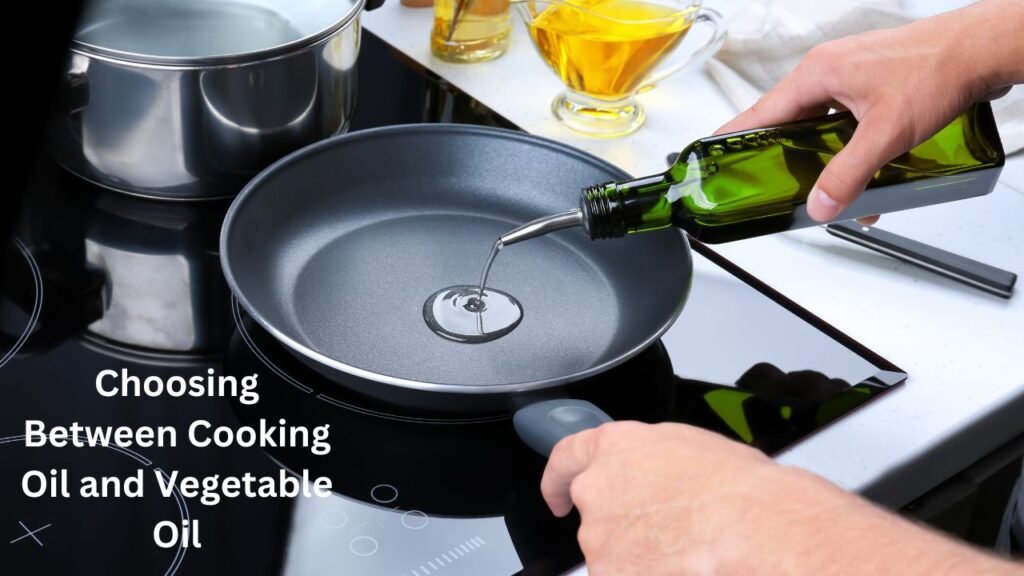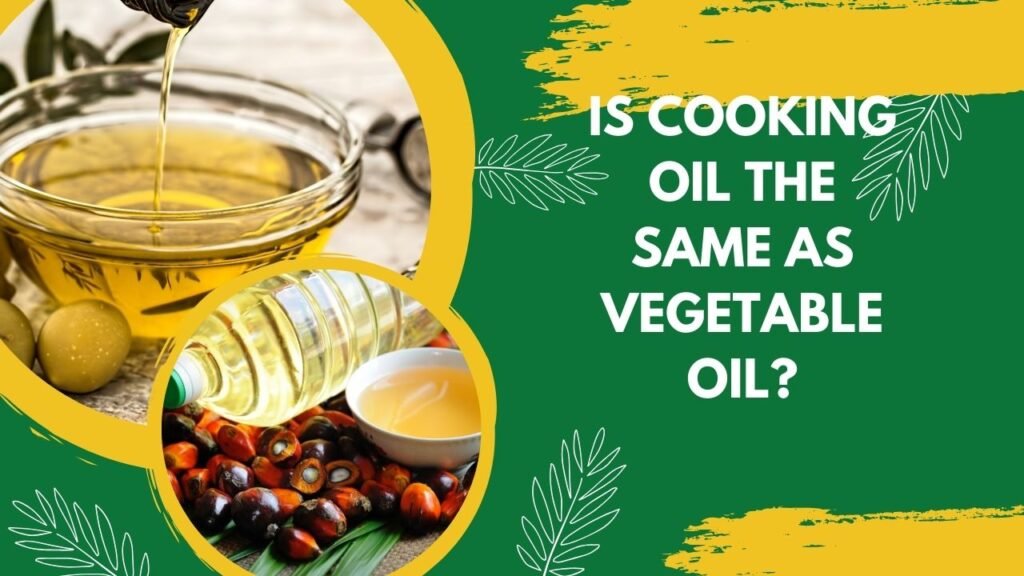Have you ever stood in the grocery store aisle, pondering, is cooking oil the same as vegetable oil? With countless options on the shelf, it’s easy to get confused. Whether you’re a seasoned chef or a home cook, understanding the differences and similarities between cooking oil and vegetable oil can elevate your culinary game. Let’s delve into the nuances of these kitchen essentials to clear up the confusion and help you make informed choices for your recipes.
Understanding Cooking Oil and Vegetable Oil
What is Cooking Oil?
Cooking oil is a broad term that encompasses various oils used in culinary practices. These oils can be derived from plants, animals, or synthetic sources and are utilized for frying, baking, sautéing, and dressing. The key characteristics of cooking oils include their smoke points, flavors, and nutritional profiles.
What is Vegetable Oil?
Vegetable oil specifically refers to oils extracted from plant sources. It’s a type of cooking oil but not all cooking oils are vegetable oils. Vegetable oil is typically a blend of different plant-based oils, such as soybean, corn, canola, and sunflower oils. It’s known for its neutral flavor and high smoke point, making it versatile for various cooking methods.
Table: Key Differences Between Cooking Oil and Vegetable Oil
| Aspect | Cooking Oil | Vegetable Oil |
|---|---|---|
| Definition | Broad category including all oils used in cooking | Specific type of cooking oil derived from plants |
| Sources | Plants, animals, synthetic sources | Primarily plant-based sources like soybean, corn |
| Flavor | Varies (neutral to distinct) | Generally neutral |
| Smoke Point | Varies widely depending on the type | Typically high (400°F – 450°F) |
| Uses | Frying, baking, sautéing, dressing | Frying, baking, general cooking |
| Nutritional Profile | Varies based on the oil type | Generally contains polyunsaturated fats |
The Origins: How They Came to Be
History of Cooking Oil
Cooking oils have been used for thousands of years, with early civilizations extracting oils from seeds, nuts, and fruits. Olive oil from the Mediterranean, sesame oil from Asia, and animal fats like lard have been staples in various cultures. The development of different extraction and refining methods over time has expanded the variety of cooking oils available today.
History of Vegetable Oil
Vegetable oil, as we know it today, became popular in the late 19th and early 20th centuries with the advent of industrial extraction methods. The ability to mass-produce vegetable oil from crops like soybeans and corn made it a staple in households and restaurants due to its affordability and versatility.
Types of Cooking Oils vs. Vegetable Oil
Common Types of Cooking Oils
- Olive Oil: Known for its rich flavor, ideal for salads and low-heat cooking.
- Coconut Oil: Adds a tropical flavor, suitable for baking and sautéing.
- Avocado Oil: High smoke point, perfect for high-heat cooking like grilling.
- Peanut Oil: Great for frying due to its high smoke point and mild flavor.
- Sesame Oil: Adds a nutty flavor, commonly used in Asian cuisine.

Common Types of Vegetable Oils
- Canola Oil: Neutral flavor, versatile for baking and frying.
- Soybean Oil: Commonly used in processed foods, neutral taste.
- Corn Oil: High smoke point, good for frying and baking.
- Sunflower Oil: Light flavor, ideal for general cooking and frying.
- Safflower Oil: Similar to sunflower oil, with a high smoke point.
Table: Popular Cooking Oils and Their Characteristics
| Cooking Oil | Source | Flavor Profile | Smoke Point (°F) | Best Uses |
|---|---|---|---|---|
| Olive Oil | Olives | Rich, fruity | 375-420 | Salads, low-heat cooking |
| Coconut Oil | Coconuts | Sweet, tropical | 350-385 | Baking, sautéing |
| Avocado Oil | Avocados | Mild, buttery | 520 | High-heat cooking, grilling |
| Peanut Oil | Peanuts | Mild, nutty | 450 | Frying, deep-frying |
| Sesame Oil | Sesame seeds | Nutty, robust | 350-410 | Asian cuisine, stir-fries |
Nutritional Comparison
Vegetable Oil
Vegetable oils are typically high in polyunsaturated fats, which are considered healthier than saturated fats. They often contain omega-3 and omega-6 fatty acids, essential for heart health. However, the refining process can strip some of the natural nutrients from the oil.
Cooking Oil
The nutritional profile of cooking oils varies significantly based on the type. For example:
- Olive Oil: High in monounsaturated fats and antioxidants.
- Coconut Oil: Rich in saturated fats, which are more stable but controversial regarding health.
- Avocado Oil: Contains monounsaturated fats and vitamin E.
- Peanut Oil: Good source of monounsaturated and polyunsaturated fats.
Table: Nutritional Breakdown of Selected Oils
| Oil Type | Total Fat (1 tbsp) | Saturated Fat | Monounsaturated Fat | Polyunsaturated Fat | Vitamin E |
|---|---|---|---|---|---|
| Olive Oil | 14g | 2g | 10g | 1.5g | 1.9 mg |
| Canola Oil | 14g | 1g | 7g | 5g | 2.4 mg |
| Coconut Oil | 14g | 12g | 0.5g | 0.5g | 0 mg |
| Avocado Oil | 14g | 2g | 10g | 2g | 2 mg |
| Peanut Oil | 14g | 2g | 7g | 5g | 2.4 mg |
| Sesame Oil | 14g | 2g | 6g | 6g | 1 mg |
Flavor and Culinary Uses
Flavor Profiles
Cooking oil encompasses a wide range of flavors, from the robust, fruity notes of olive oil to the sweet, tropical essence of coconut oil. This variety allows chefs and home cooks to choose the right oil to complement different dishes.
Vegetable oil, on the other hand, is prized for its neutral flavor. This makes it a go-to choice for recipes where you don’t want the oil to interfere with the taste of other ingredients, such as in baking, frying, and sautéing.
Culinary Applications
- Cooking Oil: Choose based on the desired flavor and cooking method. For instance, use olive oil for salad dressings or avocado oil for high-heat frying.
- Vegetable Oil: Ideal for general cooking purposes where a neutral flavor is preferred. Great for frying, baking, and making sauces where the oil should not overpower other flavors.
Health Implications
Health Benefits of Cooking Oils
Different cooking oils offer varying health benefits:
- Olive Oil: High in monounsaturated fats, which can reduce bad cholesterol levels.
- Coconut Oil: Contains medium-chain triglycerides (MCTs) that may boost metabolism.
- Avocado Oil: Rich in vitamins and antioxidants, beneficial for heart health.
Health Benefits of Vegetable Oils
Vegetable oils are generally low in saturated fats and high in polyunsaturated fats, which can help lower cholesterol levels and reduce the risk of heart disease. However, excessive consumption of omega-6 fatty acids found in some vegetable oils can lead to inflammation if not balanced with omega-3 intake.
Potential Health Concerns
- Refining Process: Both cooking and vegetable oils often undergo refining, which can remove beneficial nutrients and introduce trans fats.
- Oxidation: Polyunsaturated fats in vegetable oils can oxidize when heated, leading to harmful free radicals.
- Balance: It’s important to balance the intake of different types of fats to maintain optimal health.
Environmental and Ethical Considerations
Sustainability
The production of both cooking and vegetable oils can have significant environmental impacts. Sustainable sourcing is crucial to minimize deforestation, habitat destruction, and carbon emissions associated with oil production.
Ethical Sourcing
Opting for oils that are certified organic or sustainably sourced can ensure that the products are produced with minimal environmental harm and fair labor practices.
Table: Sustainability Comparison of Common Oils
| Oil Type | Sustainability Concerns | Certified Sustainable Options |
|---|---|---|
| Olive Oil | Water usage, land management | Organic, PDO (Protected Designation of Origin) |
| Canola Oil | GMO concerns, pesticide use | Non-GMO, organic |
| Coconut Oil | Deforestation, fair trade issues | Fair trade certified |
| Avocado Oil | High water consumption, deforestation | Organic, fair trade certified |
| Peanut Oil | Land use, pesticide application | Organic, non-GMO |
| Sesame Oil | Water use, fair labor practices | Organic, fair trade certified |

Practical Tips: Choosing Between Cooking Oil and Vegetable Oil
When to Use Cooking Oil
- Flavor-Driven Dishes: Use oils like olive or sesame for their distinct flavors.
- High-Heat Cooking: Opt for oils with high smoke points like avocado or peanut oil.
- Health-Focused Recipes: Choose oils with beneficial fats, such as olive or avocado oil.
When to Use Vegetable Oil
- Neutral Taste Requirements: Perfect for baking, frying, and sautéing where oil flavor shouldn’t dominate.
- Budget-Friendly Cooking: Vegetable oil is generally more affordable, making it ideal for everyday cooking needs.
- Versatile Applications: Suitable for a wide range of recipes due to its neutral profile.
Table: Best Uses for Cooking Oil vs. Vegetable Oil
| Use Case | Cooking Oil | Vegetable Oil |
|---|---|---|
| Salad Dressings | Extra virgin olive oil | Vegetable oil (if neutral flavor needed) |
| Frying | Peanut, avocado, sunflower oils | Canola, vegetable, sunflower oils |
| Baking | Coconut oil, olive oil | Vegetable oil, canola oil |
| Sautéing | Olive oil, sesame oil | Vegetable oil, canola oil |
| Sauces and Marinades | Sesame oil, olive oil | Vegetable oil (neutral base) |
Personal Reflections: My Oil Choices in the Kitchen
I remember the first time I realized is cooking oil the same as vegetable oil wasn’t as straightforward as I thought. My grandmother swore by her olive oil for everything, while I reached for vegetable oil for its versatility and neutral taste. Over time, I’ve come to appreciate the unique qualities each oil brings to the table. Using the right oil for the right dish not only enhances flavors but also aligns with health and sustainability values. It’s fascinating how something as simple as oil choice can make such a difference in your cooking experience!
FAQs About Is Cooking Oil the Same as Vegetable Oil
1. Is all vegetable oil a type of cooking oil?
Yes, vegetable oil is a subset of cooking oils. While all vegetable oils are cooking oils, not all cooking oils are vegetable oils. Cooking oils include a broader range of oils from different sources, including animal-based and synthetic oils.
2. Can I substitute vegetable oil with other cooking oils?
Generally, yes. However, the substitution might affect the flavor and smoke point of your dish. For example, using olive oil instead of vegetable oil will add a distinct taste, which may or may not be desirable depending on the recipe.
3. Which is healthier: cooking oil or vegetable oil?
It depends on the specific type of oil. Some cooking oils, like olive and avocado oil, are healthier due to their high content of monounsaturated fats and antioxidants. Vegetable oils can be healthy too but often contain higher levels of polyunsaturated fats and may be more processed.
4. Why is vegetable oil so commonly used in baking?
Vegetable oil is favored in baking for its neutral flavor and ability to create moist and tender baked goods. Its high smoke point also makes it versatile for various cooking methods.
5. Are there any environmental concerns with using vegetable oil?
Yes, the production of vegetable oil can lead to deforestation, habitat destruction, and high water usage. Choosing sustainably sourced or organic vegetable oils can mitigate some of these environmental impacts.
Final Thoughts
Is cooking oil the same as vegetable oil? The answer is both yes and no. While vegetable oil is a type of cooking oil, cooking oil encompasses a much broader range of products with diverse flavors, nutritional profiles, and culinary uses. Understanding the differences can help you make informed choices that enhance your cooking, support your health, and align with your ethical values.
Next time you’re in the kitchen, take a moment to consider which oil best suits your recipe. Whether you’re aiming for a flavorful stir-fry with sesame oil or a neutral backdrop with vegetable oil, the right choice can make all the difference. Embrace the variety, experiment with different oils, and enjoy the rich flavors and textures they bring to your meals. Happy cooking!


